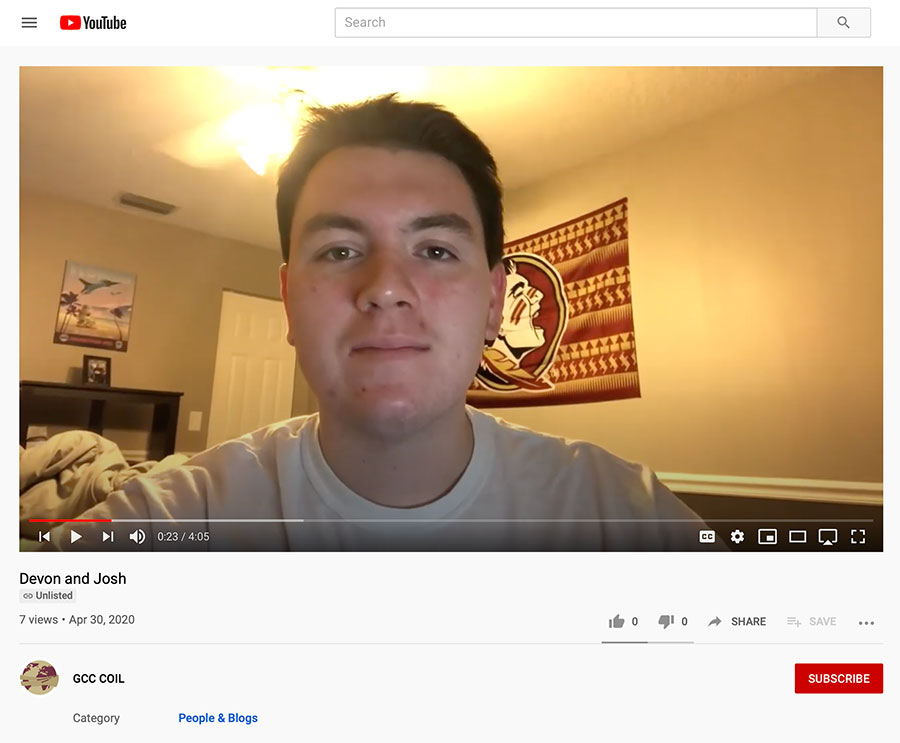
While much of the academic world was getting acquainted with working online during the spring semester, the Global Citizenship Certificate (GCC) program at Florida State University was thriving in the virtual space.
Before the COVID-19 pandemic forced universities to a remote learning model, the GCC program, a collaborative program between the Center for Global Engagement and International Affairs in the College of Social Sciences and Public Policy, was already successfully piloting the Collaborative Online International Learning (COIL) initiative this spring with The Technology College of Americana in São Paulo, Brazil.
COIL projects are co-developed by professors in at least two different countries to facilitate students communicating and learning from one another. At FSU, students taking Global Perspectives, a foundational GCC course, engaged virtually and collaborated throughout the semester via video conferencing. Their work included an online project and final collaborative video project.
COIL initiatives are an innovative way to provide authentic opportunities for intercultural, transnational learning to students said Elçin Haskollar, the program director for the GCC and co-lead professor of this initiative.
“COIL projects complement the Global Citizenship Certificate’s goals of preparing our students for a multicultural environment and diverse workforce,” Haskollar said. “Students develop critical thinking and team-building skills, take part in intercultural communication, learn different perspectives, enhance their technological skills through their online interactions and experience an intercultural exchange without having to leave the classroom.”
Due to the success of the pilot program this spring, GCC will be expanding this project to include FSU students in two more sections of Global Perspectives this fall.
As part of the program, two students from FSU were paired with two students from FATEC Americana, and the groups communicated throughout the semester to get to know each other and exchange information about culture, life and society.
“The COIL Project developed with Professor Haskollar and her students gave me and my students an amazing opportunity to reflect about our own culture and its differences and similarities with American culture,” said Carlos Augusto, a professor at FATEC Americana and co-leader of this COIL project.
Each student completed a variety of assignments and projects to link theories and concepts learned in the classroom with how those theories and concepts show up in a different cultural setting. As a part of their final project, FSU and FATEC students created a collaborative YouTube video with their partners to present what they had learned.
“The collaborative online international experience was greatly beneficial,” said Augustin Smith, a junior studying real estate. “This experience allowed for me to gain valuable insights into another culture. I now feel more educated about culture and am more capable of handling cross–cultural conflict.”
Other FSU students said the COIL project was integral to gaining a firsthand knowledge and understanding of another culture.
“During my correspondence with my Brazilian counterparts, I learned a great deal about how different our two worlds are,” said Joshua Matzner, a junior studying management at FSU. “My experience in the COIL program has helped expand my understanding and appreciation for other cultures. Because of this program, I am better able to recognize differences between my culture and the cultures of others while embracing these differences at the same time.”
FSU students interested in developing a deeper understanding of the world and cultural competencies core to succeeding in a globalized workforce can begin by enrolling in the Global Citizenship Certificate program and its foundational course, Global Perspectives. Learn more at cge.fsu.edu/globalcitizen or schedule a personal information session by emailing globalcitizen@fsu.edu.




